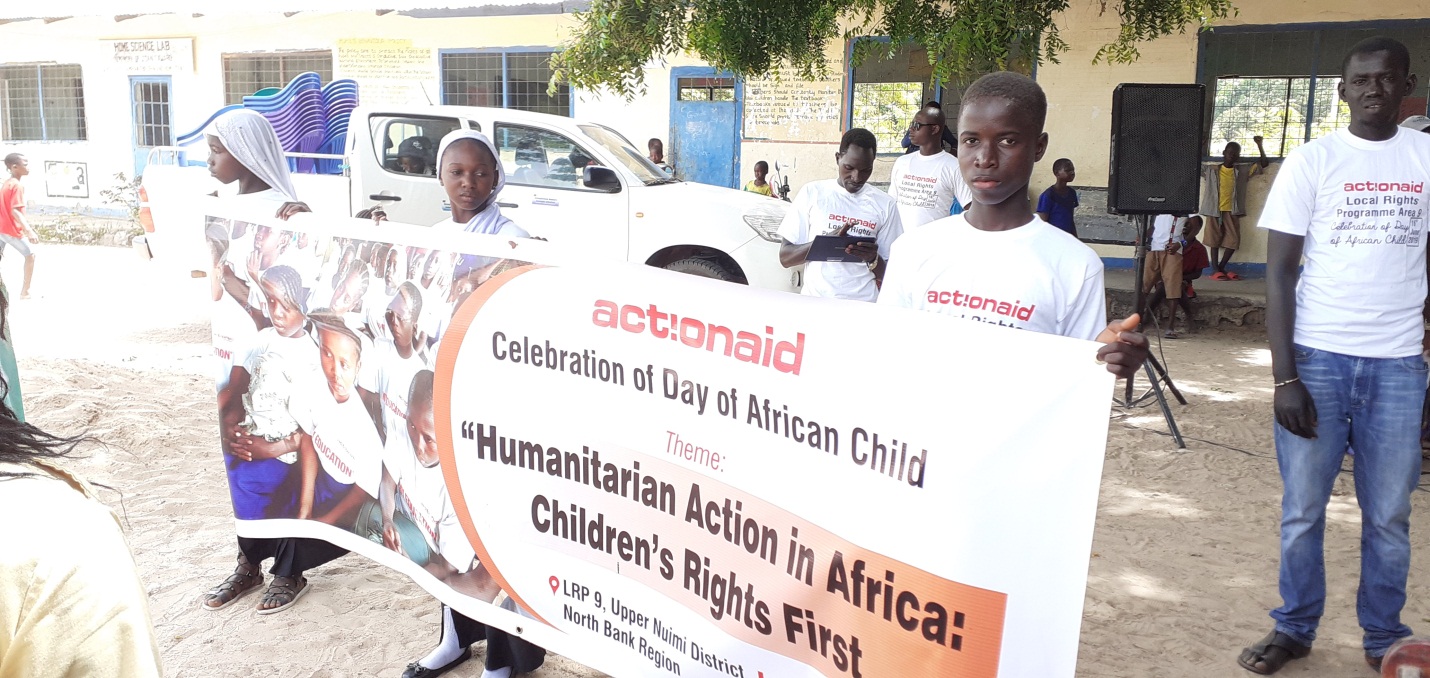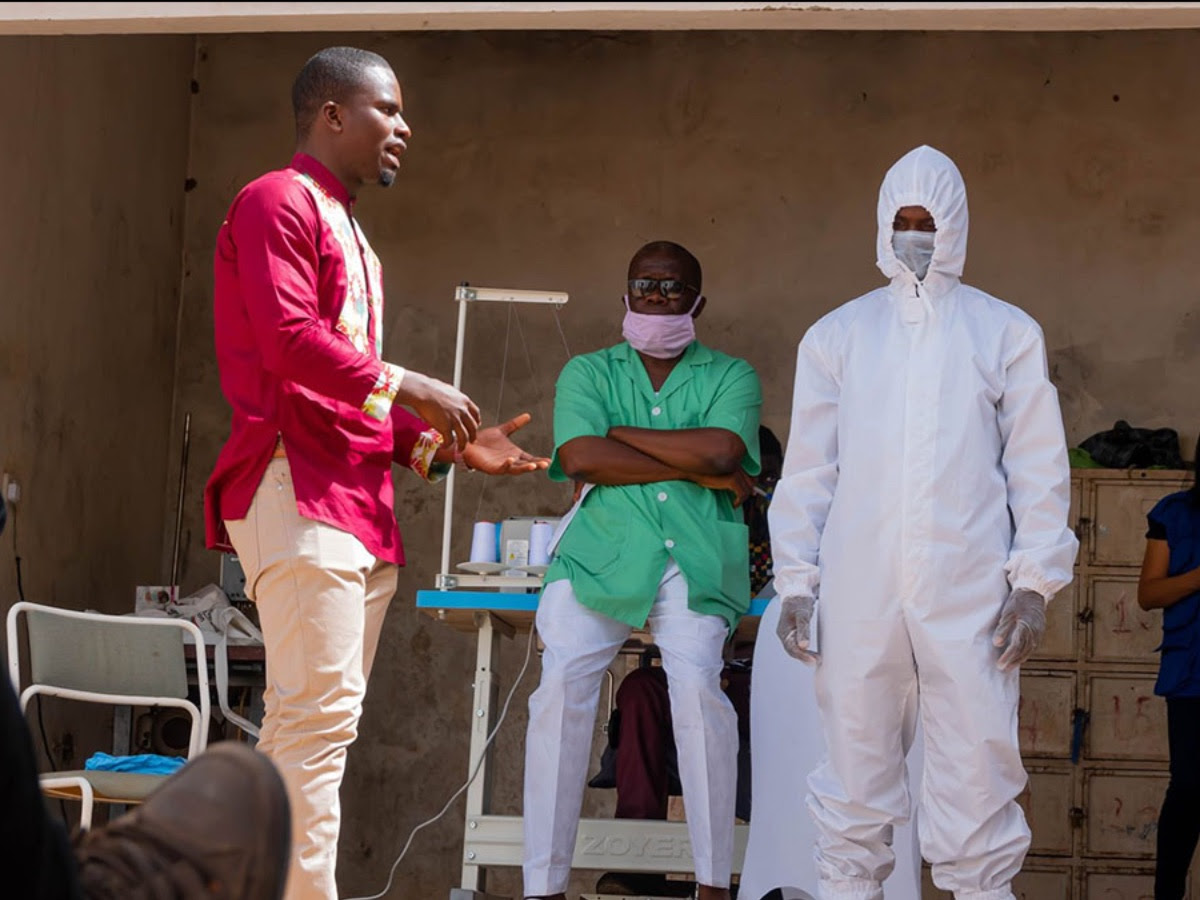By: Haruna Kuyateh
Action Aid International The Gambia through Local Program Area 9 (LRP) in Juffureh office of Upper Nuimi celebrate the Day of the African Child.
The theme: Humanitarian Action in Africa: Children’s Rights First. The day was held at Bakalarr Upper Basic and Secondary School and attended by 14 schools within the three Eco Zones of Juffureh, Albreda and Jimbana in the North Bank Region.
Acting LRP Manager Foday Kanyi noted that the day is important on the organization yearly plan of activities, to reflect on the 1976 gun down of nearly 10, 000 black student from Soweto South Africa, who marched the streets to protect the poor quality of education.
The student marched to demonstrate their disapproval of the Black Education Act, which segregated students based on their race. The theme is crucial, as it offered to assist those who have no power or abilities on their own to seek and acquire basic amenities for everyday living and upholding to respect human dignity.
However it reported that at least 13.5million African children who have been displaced from homes as a result of conflict, climate change and poverty and are in need of humanitarian help. These children live as refugees, migrants or internally displaced persons, orphaned and Vulnerable Children (OVC) existing from day to day without the facilities and opportunities to achieved their potentials in life.
He said if 60% of African aged 15 – 17 years are not taught how to read, write and acquire baseline digital skills, literacy is a basic life skill.
Humanitarian actions that do not take in to cognizance the need for children to acquire literacy and skills is not considering the rights of a child to develop his/her full potentials.
The Day of the African Child has been celebrated since 1991 on June 16 to commemorate those killed during the Soweto uprising in South Africa and to recognize the courage of student who marched for their right to education.
He further disclosed the ongoing interventions of Action Aid International The Gambia in Upper Nuimi in poverty reduction, women and youth empowerment drive, climate change and resilient building, advocate proper utilization of public services to help improve lives and livelihood.
He reiterated for humanitarian actors to always ensure safety and protection of children during disasters.
“The day also provides opportunity to raise awareness for on-going need to improve the education of children living across Africa. Studies have revealed that 57 million primary school age children currently out of school around the world and over half are from sub Saharan Africa,” he said.
The program manager noted that educating children lifts them out of poverty.
He added: “There are hidden numbers of reasons why children go uneducated, as parents lack the income to provide school fees, distance to school, early marriage may keep girls away from classroom. The barriers to education are enormous and have impact on children especially girls, as 1 in 10 children are still missing from classroom.”
He calls for more concerted efforts and work to ensure all children are receiving quality education, noting that the total transformation of power education can have on children and it is proven that with education, especially girls are more likely to stay healthy, independent and become a force for social change.
Musukebba Jarjue Head mistress of Bakalarr Lower Basic School hailed Action Aid the Gambia for their invaluable support to the promotion and protection of children and by extension for education for all.
She said the education of children contribute to prepare them become productive citizens and help to serve their community.
Madam Jarjue noted that the recent football, children bantaba and day of African Child among others are clear testimony of their commitment to child development.
She assured of the school continue support to attainment of quality education.
Basiru Mbenga Regional Education Director Region 3 also commended Action Aid The Gambia in complementing government efforts in strengthens education for all and ensures quality teaching and learning.
He said research has revealed that household contribution to education by parents is over D700 million and this prompted government and it development partners to introduce School Improvement Grant (SIG) as means addressing household expenses on education.
According to him, SIG scheme also enable parents to save costs and contribute to poverty reduction.
“The introduction of school improvement grants SIG aims to support parents by providing free education including text books,” he noted.
He pointed out that national study on Out of School children revealed that 217, 000 are out of school in the Gambia, despite the intervention of government in providing free education, there are still pocket of children not going school.
Director Mbenga stated that Ministry of Basic and Secondary Education continue to encourage teachers at Madarasa to ensure children learn English and other subject with the ultimate objective of promoting education for all initiative.
“There is need to conduct study to find out some of the hidden cost by parents that still continue to prevent children from attaining school at all levels,” he urged.





